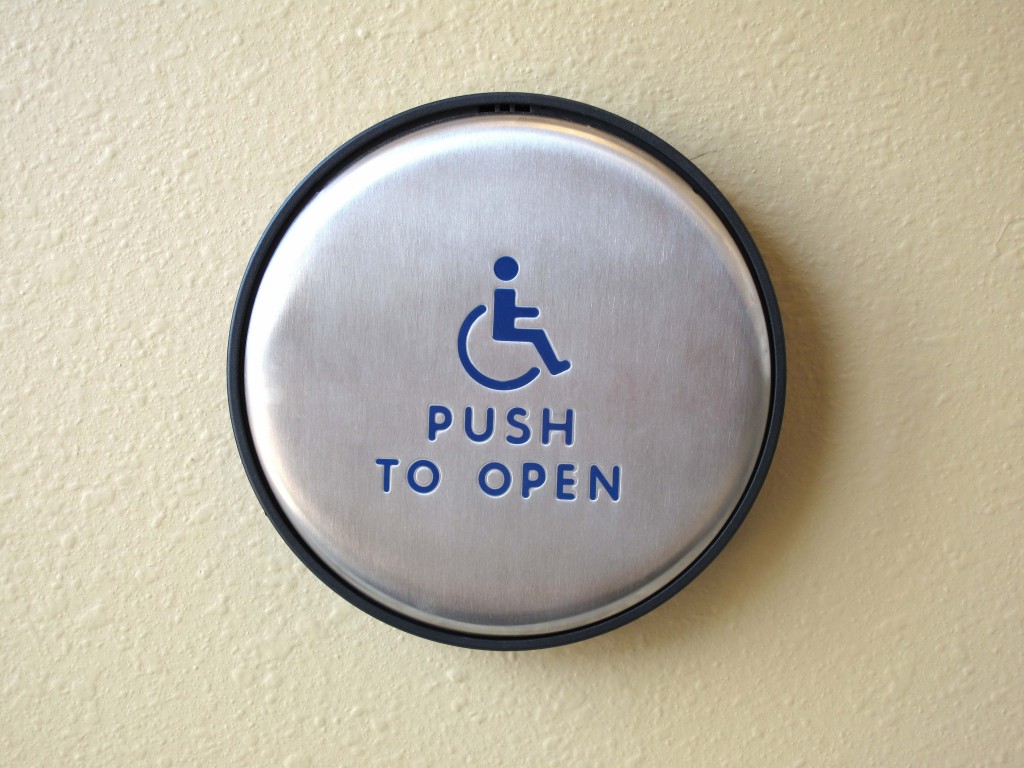As with many businesses, my company has experienced changes since the start of the COVID-19 pandemic resulting in the decision to reconsider and redefine what the workplace will look like for my company and my employees. I have recently begun to tour many buildings with office space available to identify the best solution for my current needs.
What I have learned from this experience is that while many of these facilities meet the bare minimum requirements of compliance with the Americans with Disabilities Act (ADA), none of them meet the ideals of universal design and very few are willing to consider the impacts and limitations this creates for employees and business owners with disabilities.
A few examples of what I have seen include accessible parking and curb cuts being positioned away from the main entrance to the building, no power assisted doors, bathrooms that would not be usable by people in a wheelchair, and cafeterias not designed to be inclusive of people with disabilities. These examples were not limited to older commercial buildings but were just as much a problem in new office spaces that have been built over the last few years.
After having conversations with building and facilities managers about their rental spaces, I have come to the conclusion that not only do they not see the need to create accessible workspace that includes people with disabilities, but they have determined they do not care to attract business owners like me – entrepreneurs with disabilities.
I was shocked at their lack of interest in gaining my business during a time when many business-owners are reevaluating the need for physical office space. Even after explaining that I employ people with disabilities that would regularly be accessing this space, as well as hosting meetings with national and internationally recognized disability civil rights advocates, politicians, and business leaders interested in inclusion there was little interest in accommodating my requests for creating space that was accessible for people with disabilities. Even knowing that I have had reporters from various local and non-local news outlets video tape or interview me at my office didn’t phase them. Their position remained firm that tenants would have to pay for any updates to increase accessibility of their space.
To be clear, I am not talking about accessibility of individual office space, but main areas of the building that all people access. Tenants interested in creating inclusive and accessible workspaces are required to pay for changes that incorporate universal design into common areas like building entrances, corridors, bathrooms, lobbies, and cafeterias. This becomes a disincentive for business leasing commercial office space for creating an environment that is accessible and for including people with disabilities in their workforce.
“In this environment where office owners, building owners are losing so much money because they’re half empty and people are choosing other options or working from home, wouldn’t you think that they’d want a competitive advantage and invest in that [power assisted doors] so they can differentiate themselves from other businesses?” This is the question that Peter Blanck, Chairman of Burton Blatt Institute (BBI) posed in a recent episode of Disability Matters.
I remain determined to only lease accessible and inclusive space, but I can’t help but think about all the other Disability-Owned Business Enterprises (DOBE) out there in the Pittsburgh area and across the country who are seeking office space for their businesses. How many DOBEs have been turned away by commercial space landlords and building owners not considering them as a customer? How many have been forced to pay for accessibility features that bring in additional revenues by creating a more desirable space?
I know that I will be asking this question in future conversations with DOBEs when I hold sessions with Disability:IN as their master mentor. For forward thinking business owners and entrepreneurs, I encourage you to join me and make it clear that the minimum is not enough. We can change the conversation by speaking up and making it clear to commercial landlords that this is a requirement for our continued business.
We wouldn’t settle for commercial building owners who won’t pave parking lots, repair leaking sinks, or replace broken windows. We shouldn’t settle for less than the best when it comes to access and inclusion either. The bare minimum is not enough.
